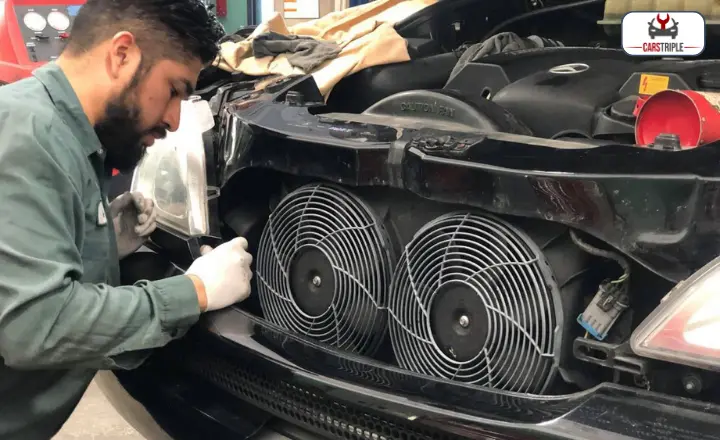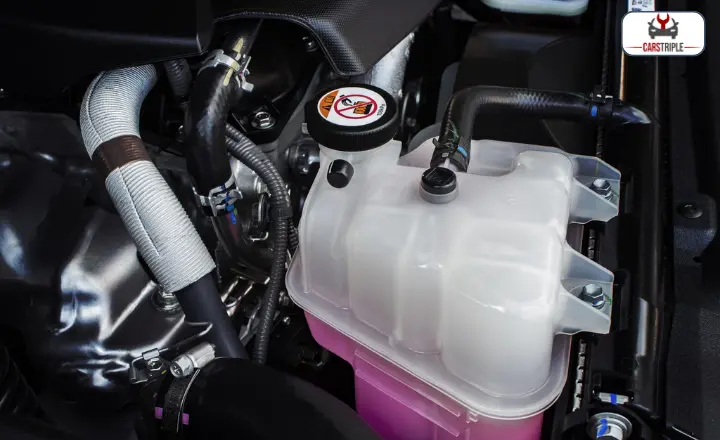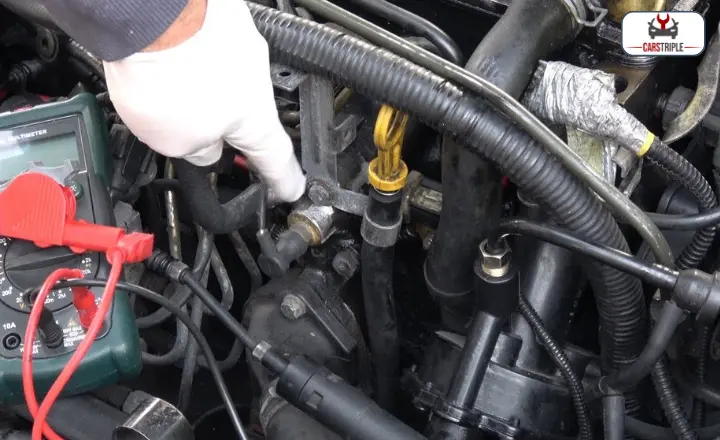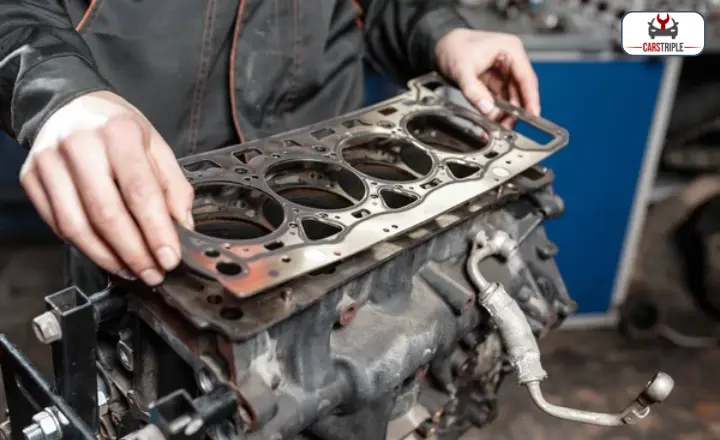Car running hot but not overheating can be a puzzling and frustrating problem, as it suggests something is amiss with your vehicle’s cooling system. While a hot engine may immediately bring thoughts of overheating and potential damage, there are instances when the temperature gauge rises without crossing into dangerous territory.
Understanding why your temperature gauge rising but car not overheating is crucial to diagnosing and resolving the issue promptly, ensuring optimal performance, and preventing costly repairs.
8 Reasons Why Your Car Running Hot but Not Overheating
It can be a puzzling and frustrating situation to find yourself in. There are several possible reasons why this might be happening, so let’s explore eight of them.
A Faulty/Clogged Cooling Radiator
A common culprit behind this issue can be a faulty or clogged cooling radiator. A radiator plays a crucial role in keeping the engine cool by dissipating heat from the coolant circulating through its tubes.

If the radiator becomes clogged with debris, dirt, or mineral deposits over time, it can hinder proper heat transfer and result in an engine running hotter than usual.
Insufficient Engine Coolant
Engine coolant is crucial in keeping your vehicle’s temperature within optimal ranges, preventing it from overheating. If there’s not enough coolant circulating through the engine, it may cause the car to run hotter than usual.
There are several reasons why your engine might be low on coolant. One possibility is that there could be a leak in the cooling system, which allows coolant to escape and reduces its overall level.
Another reason could be improper maintenance, such as neglecting regular coolant checks or failing to replace them when necessary. If you recently had repair work done on your vehicle that involved draining the coolant system but needed to refill it afterward correctly, this could also result in insufficient engine coolant.
Defective Water Pump
A defective water pump may result in inadequate coolant circulation throughout the engine. The water pump plays a vital role in circulating the coolant from the radiator to the engine and back again, ensuring proper cooling. This circulation is disrupted when it malfunctions, leading to uneven coolant distribution and overheating.
Old Engine Coolant
Old engine coolant loses its effectiveness over time. The coolant becomes less efficient at absorbing and dissipating heat from the engine. This can result in the engine running hotter than average without reaching the point of overheating.

A low coolant level can also cause your car to run hot. If there isn’t enough coolant in the system, it won’t be able to properly regulate the engine’s temperature, leading to increased heat buildup.
A Failing Engine Thermostat
The thermostat regulates your engine’s temperature by controlling the coolant’s flow. When it starts malfunctioning, it may cause your car to run hotter than usual without reaching the point of overheating.
A common reason for a failing thermostat is age and wear. The metal components inside the thermostat can become weak or corroded, leading to improper functioning. Exposure to extreme temperatures and harsh conditions can also contribute to its deterioration.
Another factor that can cause a failing thermostat is debris or rust buildup within the cooling system. This buildup restricts proper coolant circulation and can prevent the thermostat from opening and closing as it should.
A Defective Cooling Fan
The cooling fan plays a vital role in regulating the engine temperature by pulling air through the radiator to dissipate heat. If this essential component malfunctions, it can result in an overheated engine.
A worn-out or damaged motor can cause the cooling fan to stop working correctly. Constant exposure to high temperatures and vibrations can affect the motor’s performance, reducing functionality or complete failure.
An Inaccurate Coolant Temperature Sensor
An inaccurate coolant temperature sensor is the culprit behind this issue. This diminutive component is vital in monitoring your engine’s temperature and sending signals to the dashboard gauge.

If it malfunctions and provides incorrect readings, it can give you a false alarm by indicating that your car is running hot when it’s not overheating. The reason for an inaccurate coolant temperature sensor is a buildup of dirt or debris on its surface. Grime can accumulate on the sensor, causing it to deliver erroneous readings.
An Unreliable Oil Temperature Sensor
The oil temperature sensor is responsible for monitoring the temperature of the engine oil and sending signals to the car’s computer system. If this sensor malfunctions or becomes unreliable, it can cause inaccurate readings, leading to a false indication of high temperatures. It may trigger unnecessary warnings and alarms, causing drivers to panic unnecessarily.
How to Fix a Car Running Hot
Dealing with an overheating engine can be stressful, but with some know-how, you can fix it and get back on the road quickly. We will discuss some simple steps to help you resolve the issue of a car running hot.
The air conditioning system draws power from the engine, causing it to work harder and generate more heat. Turning off the AC reduces the machine’s load and allows it to cool down. To turn off the air conditioner, locate the AC button or switch in your car’s dashboard and press it. This will disengage the compressor.
Turn on the heater in your car and let it run; while this may sound counterintuitive, it can help dissipate some of the heat from your engine. When your car overheats, it’s usually due to a malfunctioning cooling system. Turning on the heater can temporarily relieve excess heat away from the engine and into the cabin.
This works because turning on the heater activates the blower motor, which draws heat away from the engine’s coolant system. As a result, this extra heat is transferred into the passenger compartment, helping to cool down your machine and yourself in the hot summer months.
You should find a safe place to pull over. You don’t want to risk causing an accident by abruptly stopping on a busy road. Once you’ve found a suitable location, shift your car into neutral or park and turn on the engine. Doing this eliminates any additional strain on the engine caused by accelerating or being in gear, allowing it to cool more efficiently.
How do you Know if Your Thermostat is Bad in Your car?
One sign of a faulty thermostat is an overheating engine. If your temperature gauge consistently shows high readings or steam starts coming out from under the hood, it might be time to check your thermostat. If you notice that the heater isn’t working correctly and doesn’t produce warm air, this could indicate a malfunctioning thermostat.
Another indication of a bad thermostat is poor fuel efficiency. When the engine runs hotter than it should due to a faulty thermostat, it can lead to increased fuel consumption. If you find yourself filling up more often without any apparent reason, consider having your car’s thermostat checked by a professional mechanic.
What are the Signs of a bad Head Gasket?
One common sign of a failing head gasket is overheating. If your vehicle’s temperature gauge consistently rises above normal operating levels or if you notice steam coming from under the hood, it could indicate coolant leaking into the engine cylinders due to a faulty head gasket.

White smoke billowing out from the exhaust pipe is another telltale indication. This occurs when coolant enters the combustion chamber and burns with fuel, creating thick white smoke.
Conclusion
If your car running hot but not overheating, it could be a sign of an underlying issue that needs to be addressed. It is essential to pay attention to any warning signs or changes in temperature to prevent further damage to your vehicle. Consider checking the coolant levels, inspecting the radiator and cooling system, and ensuring the thermostat functions appropriately.
If these steps do not resolve the issue, it may be necessary to consult a professional mechanic for a thorough diagnosis and repair. Taking proactive measures can help prolong the life of your car and ensure its optimal performance on the road.
FAQ’s
Can overheating destroy the engine?
Yes, overheating can indeed destroy an engine. This can lead to warped cylinder heads, blown head gaskets, and even cracked engine blocks. These problems can be extremely costly and may even require a complete engine replacement.
How long can a car run hot?
A car can run hot for a short period, typically around 10-15 minutes, before severe damage occurs. Various issues, such as a coolant leak, a faulty thermostat, or a broken water pump, could cause this.
Can I put new oil with old oil?
Mixing new oil with old oil in your vehicle is generally not recommended. When changing your vehicle’s oil, it is best to drain the old oil completely and replace it with fresh oil. This ensures that you are providing your engine with optimal lubrication and protection.

